No products in the basket.
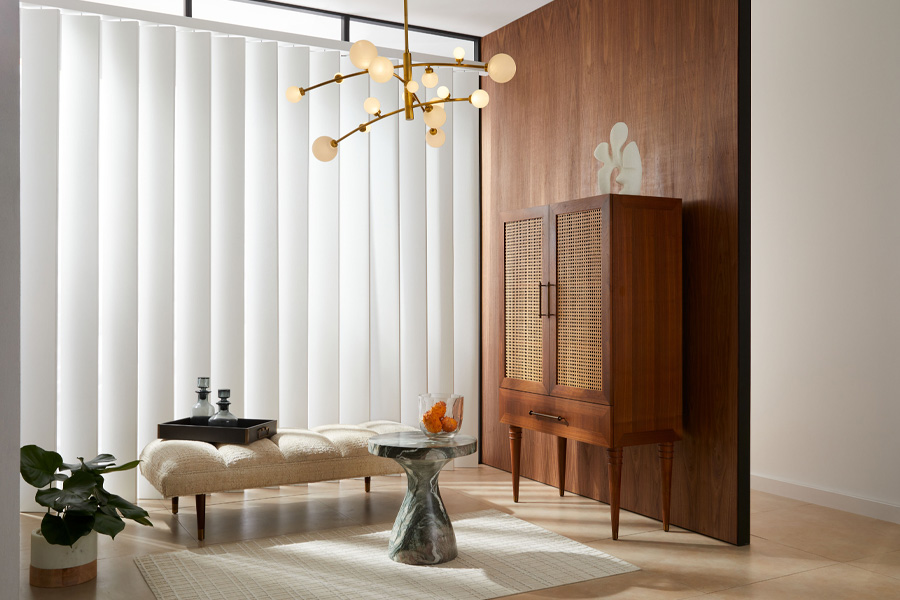
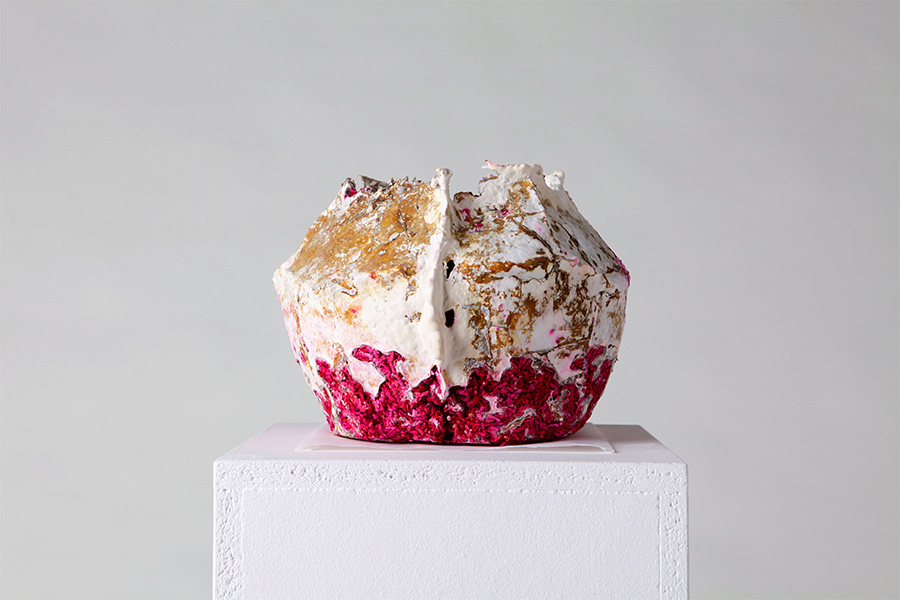
The second edition of Green Grads at Planted took place on the weekend of 24-25th September 2022 showcasing the work of ‘the cream of over 50 recent graduates’ and addressing the world’s most pressing eco-issues drawn from a range of design disciplines from UK colleges and universities.
Green Grads is an ongoing initiative to platform recent UK graduates who are meeting head-on the world’s most pressing eco-issues such as sustainability, climate crisis, circular production, waste and pollution, depletion of resources and biodiversity. Green Grads is also highlighting a return to nature and craft, and the power and desirability of local materials and strengthened communities.
For the special event graduates were drawn from a huge range of disciplines. This included product and furniture design, engineering, material innovation, animation, textiles, ceramics, illustration and graphics, fine art, architecture, and interior design, and more. Graduates came mainly from the talent pool of 2022 but a few were also from 2021 and 2020.
They were carefully chosen by founder and curator Barbara Chandler, who’s explored degree shows at colleges from Falmouth to Manchester, then criss-crossing London, and finally spending hours at the two editions of the New Designers shows this summer. Green Grads is a potent pathway for innovation, linking UK’s top graduate talent with industry professionals that include design agencies, manufacturers, retailers and galleries.
“Our show is an inarguable double whammy: we deliver support for new designers and support for the environment at one and the same time…through engaging content created/exhibited by the cream of recent graduates from British universities,” says Barbara Chandler. She adds: “We are not saying that all the projects and ideas we show will be commercially viable, or indeed possible right now in the ‘real world’ but they are seeds to nurture and grow, the results of in-depth research and dedicated hours in studios and workshops. Their inventors are the talent we so sorely need to help solve our eco-crises.”
“Furthermore, sustainability is now a commercial imperative. Consumers and trade clients, when deciding what to buy, are demanding sustainability, and they want information and action. Over 80 leading brands have already signed up to the British Retail Consortium’s Climate Action Road Map. Their research shows that 88% of customers want brands to help them live sustainably; 70% of customers are more interested in the transparency and sustainability of products than choosing their ‘favourite” brand’; 79% of customers are changing their preferences based on the social responsibility, inclusiveness and environmental impact of their purchases.”

Back at the show there were an intriguing array of special features. In the centre, there was a large and futuristic machine literally growing pattern on cloth, using little water and no harmful chemicals. It is harnessing bacteria, which Central Saint Martins’ graduate Charlotte Werth’s Moving Pigment used to create lines and gradients of colour. “It’s a collaborative process with living organisms,” she says. She believes her methods could replace the petrochemical dyes that pollute water and landscape, and destroy ecosystems.
A material of the moment is fast-growing mycelium, part of the fungi kingdom, a ubiquitous underground network of threads from which mushrooms grow. It’s already producing materials for packaging, clothing, food and even construction.
At Green Grads it was the strangely-beautiful cluster of mycelium vessels created by Georgie Gerrard , graduating this year from Loughborough University. She has grown mycelium in plaster moulds left covered in clingfilm in a greenhouse for at least seven to ten days. Then she’s removed the results, baked them, let them air dry some more to cure and change colours. Each resulting organic shape is genuinely unique and strangely beautiful – see cover image.
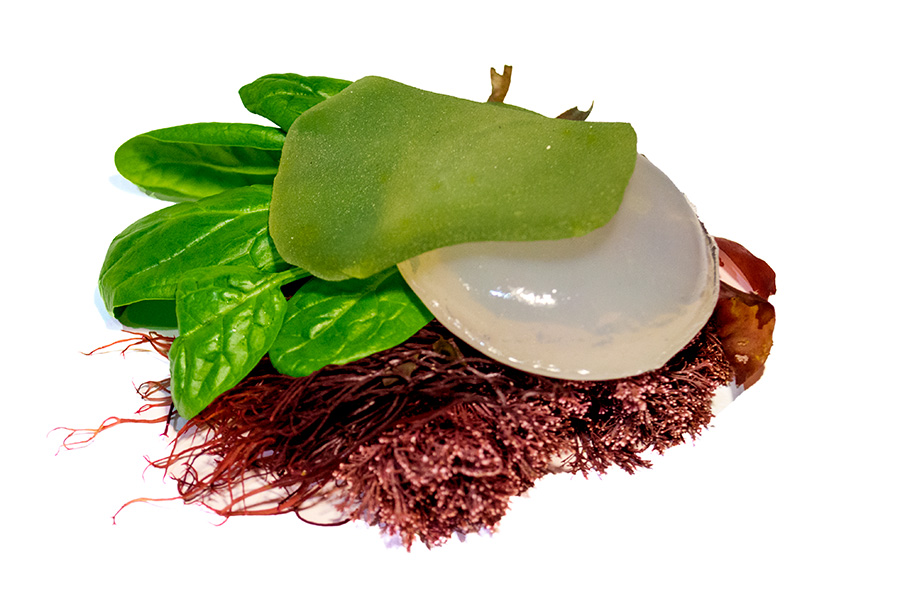
Over at the Seaweed Grotto there was an abundant resource from Britain’s coast to be explored. Ideas included an attractive and flexible sheet material invented by Libby Challoner of Falmouth University, which she’s even printed with photographs. It could also be used for medical test kits to cut the use of disposable plastic.
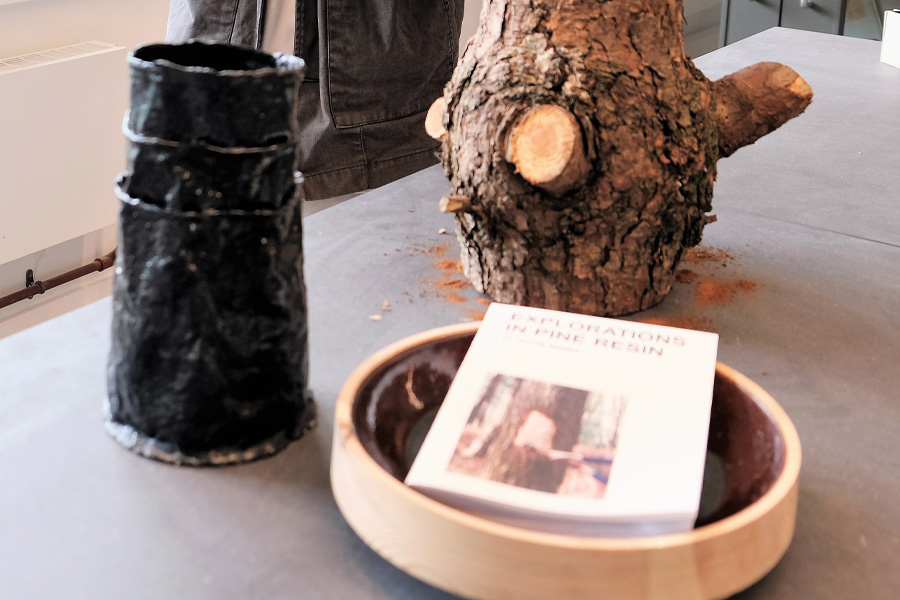
Another interesting concept at Green Grads to discover was resin harvested from pine, fir and cedar trees, used extensively in the 19th and 20th centuries as a way to waterproof ships. However, it was pushed aside by oil-based alternatives…until now. In the Woodland feature Jacob Marks was reviving this traditional craft. “Resin is renewable, carbon-negative, and biodegradable,” he says, “and could be an ideal material in an oil-free future.” He showed how resin can make almost any material watertight including paper, card and mesh. He also made handles, platters and bowls.
Graduate Sam Foxton used huge chunks of “green” timber complete with bark for the base of small tables with tops of natural timber, using traditional joints that allow the wood to move.
In the Clay Café at Green Grads, potters were expressing a low-carbon love of their locality. An innovative scheme by developer Gabriel Lau of Golden Earth in Wimbledon has been dishing out construction clay to London artist and crafts people for many months. It’s been used by Isi Rodriguez, graduating from the RCA this year for his arresting vessels, which also incorporate discarded London bricks. “Crossing London three times, dragging a shopping cart with 80kg of wet clay was just the beginning of an exciting adventure.”
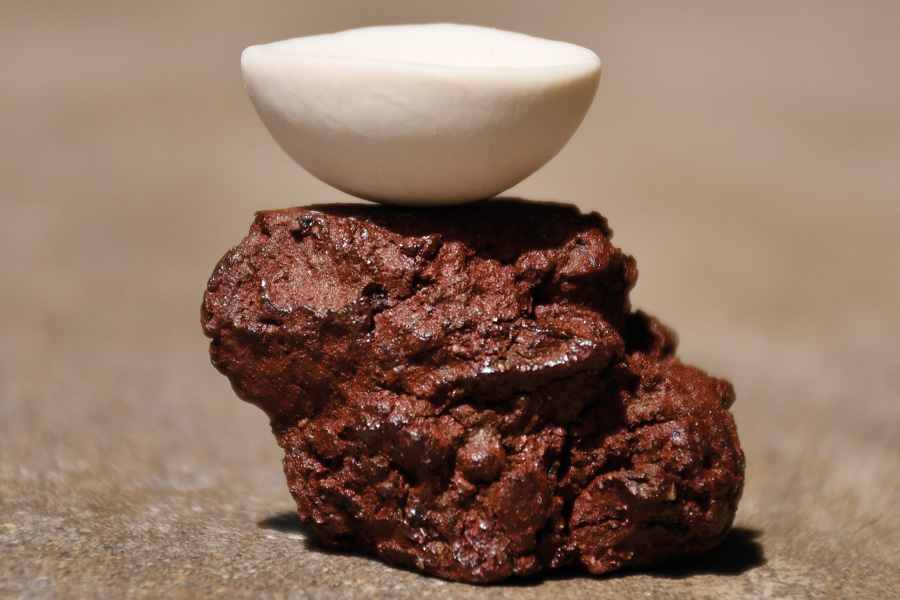
Victoria Coxall was also using clay from Golden Earth, for stranger more alien forms, adding detritus from the River Thames and waste metal from her college, Central Saint Martins. “My ‘slow ceramics bring a sense of belonging and of community and create an emotional relationship between ourselves and the environment.”
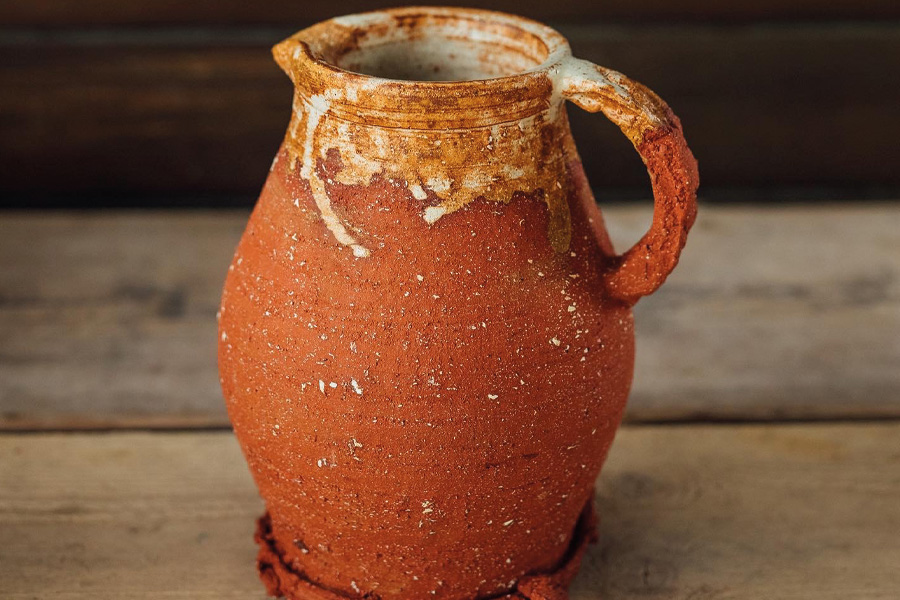
Bruno Schooling, from Manchester School of Art, has already won a prestigious award from the Conran Shop. His “site-specific” project “Ground” was tableware made from the iron-rich earth of Keepers Cottage Organics, a farm in the Peak District National Park, and includes crushed bone from the animals.
For more information please visit Green Grads website.
READ ANOTHER DESIGN STORY HERE.
Sign up to our newsletters and we’ll keep you in the loop with everything good and important going on in the worlds of design, art and independent retail.
By subscribing you agree to receive updates from ESTILA. We will not share your data with any third parties. Read our full privacy policy here.

We are a media and membership platform for design-led brands, interior designers and artists. Find latest industry news, insights, products, projects and contacts.
Join our “In the Loop” fortnightly design & art newsletter and never miss latest news from the industry.
CONNECT & LEARN
Copyright © 2015-2024 created and managed by STUDIO/ESTILA. All rights reserved | Terms & Conditions | Privacy Policy | Cookie Policy | Refund Policy